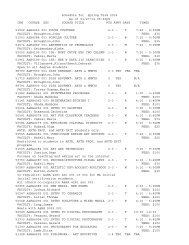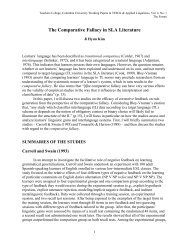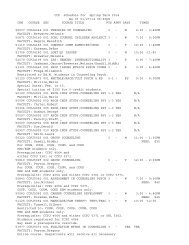UNICEF Mongolia - Teachers College Columbia University
UNICEF Mongolia - Teachers College Columbia University
UNICEF Mongolia - Teachers College Columbia University
Create successful ePaper yourself
Turn your PDF publications into a flip-book with our unique Google optimized e-Paper software.
CHAPTER 6: TEACHER EFFECTIVENESS<br />
The 28 examined schools in this study hire for the following two reasons substute teachers:<br />
• Shortage in parcular subjects: This applies in parcular to music teaching but also to a lesser<br />
extent, English, primary school, biology and chemistry. Thirteen (13) of the 35 educaon<br />
managers reported a shortage of music teachers in their division. This has to do with the fact<br />
that pre-service teacher educaon instuons do not offer a specializaon in music educaon.<br />
42<br />
In contrast to the significant lack of music teachers, the other shortages are negligible.<br />
• Not enough hours to hire a teacher full-me: Schools assign teachers hours in addional<br />
subjects so that they have a full teaching load and a full-me job. This applies especially to<br />
single-subject teachers in fields that typically have low instruconal hours. For example, a<br />
biology teacher in a small secondary school with one class per grade was unlikely to have a<br />
full-me job, unless the educaon managers assign addional hours in subjects for which the<br />
teacher did not have any training. This parcular problem would be resolved if pre-service<br />
teacher educaon programs would only offer mul-subject teacher preparaon (e.g., prepare<br />
teachers in biology and chemistry rather than in one subject alone). In this study, eight (8) out of<br />
35 educaon managers idenfied the small teaching load of teachers as main reason for hiring<br />
substute teachers.<br />
1<br />
2<br />
3<br />
4<br />
5<br />
6<br />
Strikingly, the prototype of a teacher who takes on many addional hours in other subjects only to<br />
improve the income disappeared in the wake of the 2007 salary reform. Assigning addional hours in<br />
addional subjects used to be, at closer examinaon, a “retenon strategy” of school administrators to<br />
ensure that qualified and experienced teachers did not quit the job because of the low base salary.<br />
There is, however, a need to insert a disclaimer here. We have reasons to suggest that educaon<br />
managers underreport the number of substute teachers at their school for commonsensical reasons;<br />
that is, they believe that an experienced teacher or a (non-specialist) teacher who has been teaching<br />
a parcular subject for many years is as effecve in teaching as a young teacher with the “correct”<br />
subject specializaon or license. Repeatedly, educaon managers assured us during the interviews that<br />
experienced teachers who lack the subject specializaon are as effecve, if not more so, than young<br />
subject specialists.<br />
6.2. LICENSING PROCEDURES AND CRITERIA<br />
For the first group of non-licensed teachers—recent graduates of pre-service teacher educaon—the<br />
licensing requirements appear to be in fact more tedious than for the second group and third groups of<br />
non-licensed teachers. The second and third groups only need to take “specializaon conversion” courses<br />
in teacher training instuons to receive a license for teaching in the parcular subject. The universies<br />
have a greater autonomy in the licensing of specializaon or degree converters than in licensing their<br />
own graduates. The following may explain the discrepancies in this area of quality assurance:<br />
42 The Arts and Culture <strong>University</strong> offers a program with dual-majors cultural studies and music teaching or conducng and teaching.<br />
However, rarely do these graduates choose teaching as their career; they pursue the other major. Alternavely, the School/<strong>College</strong><br />
of Culture graduates who usually become the employees in charge of Culture Centers at soums do not go into (full-me) teaching<br />
as they would need to enroll in the specializaon conversion courses for 1 year (and oen stay unemployed during that me).<br />
But in soum-center schools these professionals, with a background in cultural studies, tend to work as part-me music teachers.<br />
TEACHERS IN MONGOLIA: AN EMPIRICAL STUDY ON RECRUITMENT INTO TEACHING,<br />
PROFESSIONAL DEVELOPMENT, AND RETENTION OF TEACHERS<br />
91



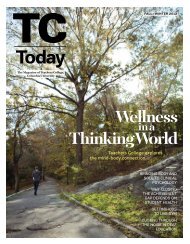
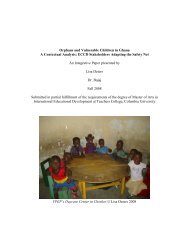
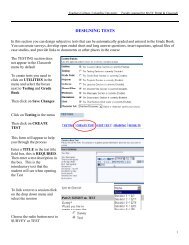
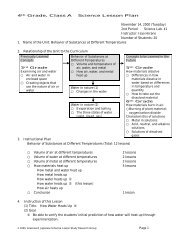

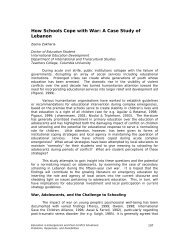
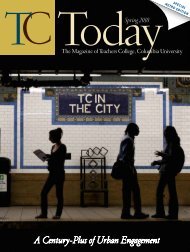
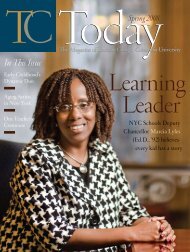
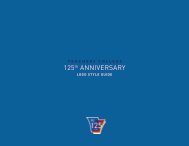

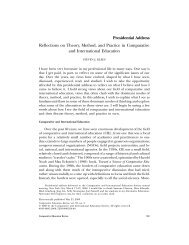
![TC Tod[...].pdf - Teachers College Columbia University](https://img.yumpu.com/27074883/1/190x252/tc-todpdf-teachers-college-columbia-university.jpg?quality=85)
